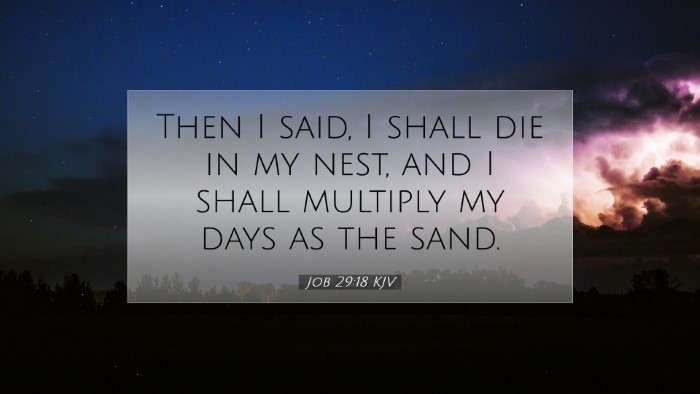Old Testament
Genesis Exodus Leviticus Numbers Deuteronomy Joshua Judges Ruth 1 Samuel 2 Samuel 1 Kings 2 Kings 1 Chronicles 2 Chronicles Ezra Nehemiah Esther Job Psalms Proverbs Ecclesiastes Song of Solomon Isaiah Jeremiah Lamentations Ezekiel Daniel Hosea Joel Amos Obadiah Jonah Micah Nahum Habakkuk Zephaniah Haggai Zechariah MalachiJob 29:18
Job 29:18 KJV
Then I said, I shall die in my nest, and I shall multiply my days as the sand.
Job 29:18 Bible Commentary
Commentary on Job 29:18
In Job 29:18, Job expresses a profound sense of confidence and hope regarding his future. This verse involves his reflections on his past, highlighting elements of his identity, his assurance in God's plans, and the certainty of life beyond his suffering. The insights drawn from various public domain commentaries enhance our understanding of this text and its implications for Christian living.
Contextual Analysis
Job, a man known for his integrity and righteousness, has experienced immense suffering and loss. In Chapter 29, he reminisces about his life before his trials, highlighting the blessings he enjoyed, the respect he received, and his intimate relationship with God. This context is crucial for understanding the depth of his statement in verse 18.
Job's Certainty of Life
Job asserts, "I shall die in my nest, and I shall multiply my days as the sand." This imagery of a "nest" conveys a sense of security and comfort associated with home and family. Scholars like Matthew Henry suggest that Job's desire to die in his nest symbolizes a peaceful end surrounded by love and stability, suggesting a longing for restoration and return to previous blessings.
Moreover, the phrase "multiply my days as the sand" implies not just an abundance of life but also a promise of continuity and legacy. In the Hebrew culture, sand often symbolizes multitude and prosperity. Albert Barnes emphasizes this as a poetic expression of Job's hope for long life, akin to the countless grains of sand that exists along the shores.
Theological Implications
Theologically, Job's hope reflects the fundamental belief in divine providence. According to Adam Clarke, Job's optimism is grounded in his relationship with God, who governs the universe. Even in turmoil, Job maintains belief that God has a purpose for him. This perspective challenges readers to consider God's overarching plan during their struggles.
Contrast with Current Suffering
In retrospect, Job's longing for the "nest" starkly contrasts with his current condition. Matthew Henry notes how Job's previous state of affluence and respect reveals the weight of his present affliction. It raises poignant reflections on the nature of suffering and the potential for restoration. The faithful can cling to promises of rejuvenation even when life appears unbearable.
Lessons for Christians
From Job 29:18, several critical lessons emerge that are essential for pastors, students, and theologians:
- Hope Amidst Trials: Job’s assurance signals that hope is vital during suffering. Believers are encouraged to hold onto God's promises, believing that current challenges will not dictate their future.
- Legacy and Influence: Just as Job thought about his days multiplying as the sand, Christian leaders should cultivate a legacy of faithfulness that influences future generations.
- Understanding God’s Nature: Recognizing God's providence encourages a more profound trust in His plans, even when circumstances appear dire. Albert Barnes affirms this trust as a pillar of faith.
Practical Applications
Finally, practical applications drawn from this verse are crucial for everyday living:
- Contemplation of Life's Journey: Believers should regularly reflect on God’s previous blessings in their lives, which can strengthen their faith through present challenges.
- Building Community: The notion of ‘nest’ suggests a need for fulfilling relationships within the community of believers, emphasizing the importance of comfort and support.
- Long-Term Perspective: Christians are encouraged to view their lives through the lens of eternity, knowing that present pain can yield eternal glory. Adam Clarke highlights the significance of maintaining a long-term vision in the face of adversity.
Conclusion
Job 29:18 serves as a powerful affirmation of hope and confidence in God's plans. Through a careful blend of historical, theological, and practical insights from public domain commentaries, it becomes clear that this verse not only encapsulates Job's longing for restoration but also challenges contemporary believers to abide in faith. As they await divine intervention, they are encouraged to reflect, rebuild relationships, and maintain an eternal perspective in their walk of faith.


